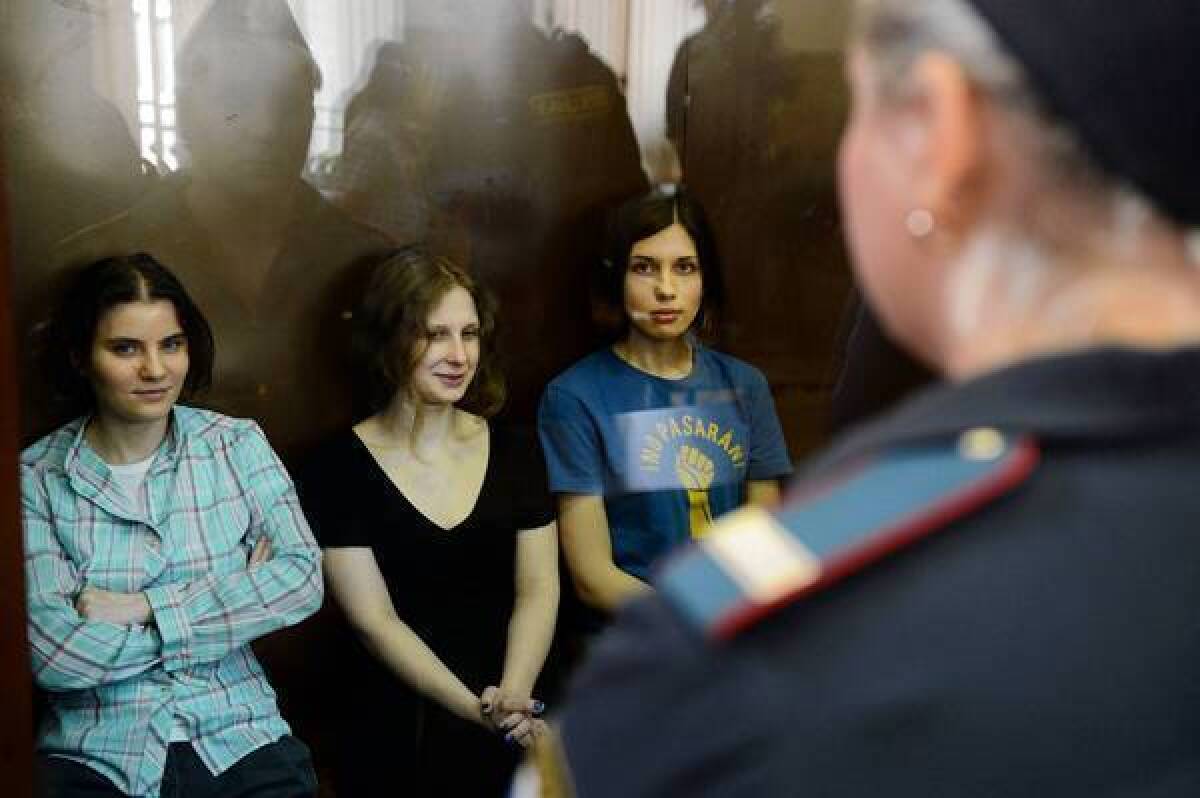Critic’s Notebook: Russian band’s sentencing shows punk’s power

- Share via
The Russian punk band Pussy Riot has never released a record, let alone an album. It’s hard to tell by the video posted online by the band whether the three women even know how to play musical instruments.
But because of that video, which documents them banging around inside a church with colored hoods on their heads, and the resulting outcry, they’re the biggest punk rock band in the world right now. Friday, its three members were each sentenced to two years in prison on charges of hooliganism.
And whether they know the three requisite chords is beside the point. The directive, “Here’s three chords — now go start a band,” used in 1976 to inform jobless, frustrated British youth of the inherent power of musical rebellion, has in 2012 morphed once again: “Here’s three ski masks and a video camera. Now go start a band.” (You can do the rest in postproduction.)
Pussy Riot became notorious when a clip of its guerrilla performance inside a Russian Orthodox church in Moscow prompted the members’ arrests. Singing an expletive-laden cry about the cozy relationship between the Putin government and the church, the band’s trial drew the world’s attention. Suddenly the five-minute punk performance and its participants, Yekaterina Samutsevich, Maria Alyokhina and Nadezhda Tolokonnikova, became the barometer on free speech in Putin’s Russia.
Their prison sentences proved once again that the punk rock spirit can not only, as writer Greil Marcus has observed, be born again at any time, anywhere, in the world — but can be a force that incites fear. This is true despite the genre at various times hitting the top of the Billboard charts and being co-opted by the very powers that idealistic punks railed against as the music was defining itself.
In 2009, I traveled through southeast Asia with Los Angeles band Ozomatli, which was on a cultural outreach mission arranged by the U.S. State Department. While traveling in Yangon, the largest city in Myanmar, I saw a declaration spray-painted on one of the city’s most prominent boulevards: It read, simply, “Punk’s Not Dead,” and though it certainly wasn’t proof of a crumbling regime, the message might have foretold how the Myanmar government has eased its hold on power in the last year.
The Pussy Riot judgment once again pushed a genre built on rebellion into the public conversation, where its influence has waxed and waned over 40 years and is hardly cutting edge in America these days, even if the grass-roots ethos continues to generate new teen-punk spirit. In fact, punk’s platform can manifest itself in tragic ways. Punk was already on the lips of many Americans after a man whose band End Apathy’s riffs conveyed incendiary white power political messages recently stormed a Sikh temple outside Milwaukee and killed six people before fatally shooting himself.
The two big news events are totally unrelated, of course, but they encapsulate how the inherent energy of punk can be harnessed through distorted chords to build a vehicle for political messages. Be they the Sex Pistols setting England on fire during the Queen’s silver jubilee in 1977 with “God Save the Queen” and “Anarchy in the U.K.,” Bikini Kill harnessing feminist ideals to create furious protest music in the ‘90s or Green Day pushing against suburban American society, punk rock in its rawest form really only needs one main ingredient: a desire to scream “No!” at the powers that be.
If that scream is loud enough and directed at the right power structure at the right moment, the sonic declaration will draw attention, or even paranoid over-reaction like that of the Russian prosecutors.
The case made me think about a conversation I had last year with Sex Pistols co-founderJohn Lydon,a.k.a.Johnny Rotten,while driving him through Los Angeles. Among other things, he told me that after the band started putting out the songs that would end up on their landmark album “Never Mind the Bollocks, Here’s the Sex Pistols,” the band’s music resulted in so many interactions with the police that they became routine and ultimately prompted him to move to New York in the early 1980s.
“It was unbearable. It was on a weekly basis, the raids. You’d sit and you’d wait. You’d keep the door open for them,” he told me wryly. “Because, you know, I got sick of them kicking it in — knowing I’d have to buy a new lock — and install it.”
The experiences led him to this simple, if typically cynical conclusion: “Police don’t need a reason, but when you ask them for one, there’s your entertainment value.”
Just as Pussy Riot imagined.
More to Read
The biggest entertainment stories
Get our big stories about Hollywood, film, television, music, arts, culture and more right in your inbox as soon as they publish.
You may occasionally receive promotional content from the Los Angeles Times.










